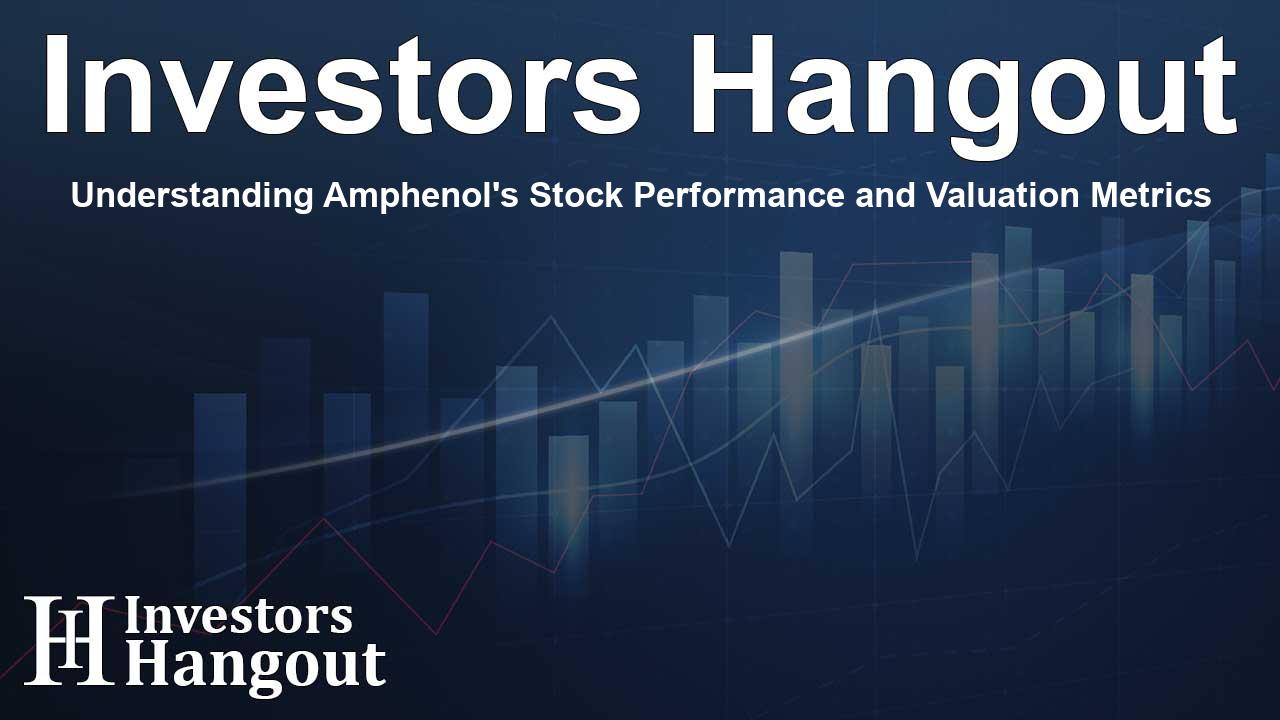Understanding Amphenol's Stock Performance and Valuation Metrics

Amphenol's Stock Performance Overview
Amphenol Inc. (NYSE: APH) is currently trading at $98.28, reflecting an encouraging spike of 0.62%. Over the last month, this stock has appreciated by 7.20%, and when we zoom out to a yearly perspective, the total increase stands at a solid 45.47%. Such positive performance provides a reassurance to long-term investors. However, it's equally essential for these stakeholders and potential investors to examine the price-to-earnings (P/E) ratio in assessing whether this stock is overpriced.
Decoding the Price-to-Earnings Ratio
The P/E ratio is a pivotal metric used to compare a company's current share price to its earnings per share (EPS). For long-term investors, this ratio serves as a critical evaluation tool, assessing the present performance of the company against not only its past earnings but also historical data and market averages in its respective industry. A high P/E ratio generally implies that investors are optimistic about the company's future, expecting robust growth, which might lead to a perception of overvaluation. Investors often associate a high valuation with an anticipation of escalating dividends down the road.
How Amphenol's P/E Measures Up
When compared to the broader category of Electronic Equipment, Instruments & Components, which boasts an aggregate P/E ratio of 48.99, Amphenol's P/E ratio stands at 47.41. This lower figure might signal to shareholders that APH’s performance could lag behind its peers. This could also imply potential undervaluation, making the investment prospects seem more attractive. However, decisions should be grounded in a careful analysis exceeding just this singular metric.
The Importance of Context in Valuation
While the price-to-earnings ratio is a vital tool for evaluating market performance, it’s crucial to approach it cautiously. A comparatively low P/E ratio can suggest that a stock is undervalued; however, it might also indicate underlying issues such as weak growth potential or financial instability. It is essential to use the P/E ratio in conjunction with various other significant financial ratios, including profitability ratios, industry trends, and qualitative factors of the company's operations.
Comprehensive Analysis for Informed Decisions
To thoroughly assess a company's financial health and make sound investment decisions, consider taking a multifaceted approach. Relying solely on the P/E ratio could lead to misinformed conclusions. Investors should also consider recent company trends, market conditions, upcoming product launches, or shifts in consumer demand. By blending this information, stakeholders can make more informed decisions that not only recognize potential risks but also seize growth opportunities that the market presents.
Frequently Asked Questions
What does Amphenol's current stock price signify?
The current stock price of Amphenol, at $98.28, reflects market confidence and strong performance metrics, particularly with a notable increase over the past months.
What is the importance of the P/E ratio?
The P/E ratio helps investors gauge a company's valuation and determine if it is worth investing. It reflects investor expectations about future earnings.
Should I consider other metrics alongside the P/E ratio?
Absolutely! Other metrics, such as profit margins, return on equity, and comparable industry analyses, should also be taken into account for a holistic view.
How does Amphenol's P/E ratio compare to its competitors?
Amphenol’s P/E ratio of 47.41 is slightly lower than the industry average of 48.99, indicating it could be undervalued or suggest its performance is less favorable compared to competitors.
What are potential risks to consider with Amphenol?
Potential risks include economic downturns, shifts in consumer preferences, and challenges in maintaining competitive advantages. It’s essential to stay informed about market trends.
About The Author
Contact Hannah Lewis privately here. Or send an email with ATTN: Hannah Lewis as the subject to contact@investorshangout.com.
About Investors Hangout
Investors Hangout is a leading online stock forum for financial discussion and learning, offering a wide range of free tools and resources. It draws in traders of all levels, who exchange market knowledge, investigate trading tactics, and keep an eye on industry developments in real time. Featuring financial articles, stock message boards, quotes, charts, company profiles, and live news updates. Through cooperative learning and a wealth of informational resources, it helps users from novices creating their first portfolios to experts honing their techniques. Join Investors Hangout today: https://investorshangout.com/
The content of this article is based on factual, publicly available information and does not represent legal, financial, or investment advice. Investors Hangout does not offer financial advice, and the author is not a licensed financial advisor. Consult a qualified advisor before making any financial or investment decisions based on this article. This article should not be considered advice to purchase, sell, or hold any securities or other investments. If any of the material provided here is inaccurate, please contact us for corrections.
